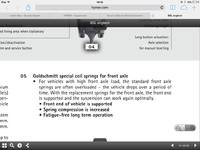Picked up my new-to-me Geist i585 last week. It's a 6m 2020 A-Class on Ducato chassis. Geist is a sub-brand of LMC, which is a sub-brand of Hymer group. I don't know much about them really. The interior seems to be really good quality. Nicely put together with hidden screw heads, thick panels and a good design. Lots of quality touches. I'll do a mini-review on another thread at some point because there's no much info out there about them...
The issue is the noise when driving...
I come from a post-conversion 2007 Ducato panel van. The conversion that was done was with reasonable quality furniture, but it was just all screwed together to make it fit. I don't think there was any consideration about how it needs to flex or move when in motion, so it creaked, squeaked, rattled and boomed a lot. But we drove around Europe in it for 6 months a couple of years back. I got used to the noises.
On a rare bit of smooth road, the Geist is fairly quiet. There's only a purr from the engine and there's not a lot of wind noise and the road rumble isn't too bad. However, as soon as I hit a bump or a tarmac joint on the motorway, it shakes and bangs really badly. It's uncomfortably loud as it shakes it way over the surface of the M6. Through the seat of 'yer pants, the ride isn't that bad, it's just the racket it makes as it hits a rough bit of tarmac (which is everywhere). This is before I've loaded any stuff in it, so it's not plates and bottles of beer that are making the racket, it's the body of the van. Any ideas what I can do?
The massive dash cowl appears to be pretty thin plastic. I assume there must be something behind it as I can barely hear the engine. But it sounds thin. Are they normally easy to get out? Could I stick some sound insulation to the back of it? I previously put sound insulation in the doors of my van and it made a big difference...
The tyres are Michelin Agilis Camping. They've only got 10k miles on, so they are pretty new. I know they've got a stiff sidewall. How much difference would a set of normal van tyres make to the ride quality? The van is well under it's 3.5t limit.
I've put semi-air suspension on my previous van. That was riding very low, so it was resting on the bump-stops all the time. It made the ride on big bumps a fair bit better. But I've checked the Geist and there's a good gap between the stops and the pad when it's at rest with a belly load of water, so I'm not sure how much difference semi-air would make. And when I hit a bump, the front causes just as much crash as the back. With the few trips I've made so far, the handling seems OK too.
Are there any bits that typically make the most noise? Is there anything else I can do?
Cheers.
The issue is the noise when driving...
I come from a post-conversion 2007 Ducato panel van. The conversion that was done was with reasonable quality furniture, but it was just all screwed together to make it fit. I don't think there was any consideration about how it needs to flex or move when in motion, so it creaked, squeaked, rattled and boomed a lot. But we drove around Europe in it for 6 months a couple of years back. I got used to the noises.
On a rare bit of smooth road, the Geist is fairly quiet. There's only a purr from the engine and there's not a lot of wind noise and the road rumble isn't too bad. However, as soon as I hit a bump or a tarmac joint on the motorway, it shakes and bangs really badly. It's uncomfortably loud as it shakes it way over the surface of the M6. Through the seat of 'yer pants, the ride isn't that bad, it's just the racket it makes as it hits a rough bit of tarmac (which is everywhere). This is before I've loaded any stuff in it, so it's not plates and bottles of beer that are making the racket, it's the body of the van. Any ideas what I can do?
The massive dash cowl appears to be pretty thin plastic. I assume there must be something behind it as I can barely hear the engine. But it sounds thin. Are they normally easy to get out? Could I stick some sound insulation to the back of it? I previously put sound insulation in the doors of my van and it made a big difference...
The tyres are Michelin Agilis Camping. They've only got 10k miles on, so they are pretty new. I know they've got a stiff sidewall. How much difference would a set of normal van tyres make to the ride quality? The van is well under it's 3.5t limit.
I've put semi-air suspension on my previous van. That was riding very low, so it was resting on the bump-stops all the time. It made the ride on big bumps a fair bit better. But I've checked the Geist and there's a good gap between the stops and the pad when it's at rest with a belly load of water, so I'm not sure how much difference semi-air would make. And when I hit a bump, the front causes just as much crash as the back. With the few trips I've made so far, the handling seems OK too.
Are there any bits that typically make the most noise? Is there anything else I can do?
Cheers.


